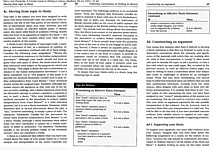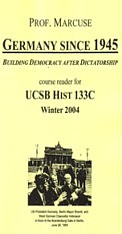| Old
Announcements
[including a selection from waaaay back] (back to top)
- Jan. 5, 2004: The readings for Jan. 7 are also available
on-line: poem "The Master
Race"; H-German
discussion comparing Iraq in 2003 and Germany in 1945
- Sept. 29, 2004: I found an interesting teaching site
developed since 1999 by a German teacher teaching at an elite school
in Korea, "WHKMLA,"
hosted by the Center for Instructional Media in Germany. It is in English,
and especially the links seem to be unique (they go beyond the usual).
- Nov. 11, 2004: Was Ronald Reagan the "real"
cause of the fall of the Berlin Wall? In an op-ed piece in the LA
Times "It
was Reagan who tore down that wall," conservative historian
Dinesh D'Souza argues he was. My and other letters to the editor argue
he wasn't.
So: What evidence does D'Souza present to make his case? What did
cause the fall of the wall?
- July 27, 2005: Deutsche Welle's Dummy's
Guide to German Elections is quite good.
-
- Feb. 27, 2006: The reading for Wed., Mar. 1, is available
as scanned images; more easily printable OCR text will be available
soon.
- Dirk Philipsen, "The Troubled Emergence of
an Idea" (1993), scans
of pages 35-55. (easier for on-screen reading, but won't print
well)
- If you want to print it, use this OCR
text of pp. 35-55. (my browser prints it on 17 pages)
- Apr. 25, 2007, 6pm: Q4 due Friday: From Fulbrook
chap. 7, name the *5* events *1949-1960* that you think are most important
in cementing the division of Germany.�State briefly the role each played.
(5 bulleted sentences)
- Apr. 28, 2007: Q5 due Monday: Based
on the introduction,
recommended (chap. 3=1938-40,
chap. 4=1940-42) ,
and required (chap. 8=1945,
chap. 9=1945-46)
reading, write 3-4 questions to ask Prof. Mahlendorf. Best is if you
clip a short quotation from the text on which your question is based,
and include it with each question. Be sure to complete reading
at least chaps. 8 and 9! Prof. Mahlendorf will be our guest
on Monday.
- Don't forget that the required film The Promise will
be this Monday evening, Apr. 30.
- May 4, 2007: Q6 due Monday: Based on the 1944/47
Horkheimer
& Adorno text on eres (password: road), give 5 short quotations
indicating each of the EIEIO causes of antisemitism. Dr. Judaken will
be our guest speaker on Monday, so please be prepared with questions
about that text.
- May 21, 2007: Q8 may be due on Wed., May 23. It will be based on Dirk Philipsen's 1990 interviews with Frank Eigenfeld and Harald Wagner (available as pdf on eres, password road; and as text and images on this site). The pdf is the best for printing.
- May 23, 2007: Q8 is due on Friday. Based on Philipsen's interviews with Eigenfeld and Wagner (on the web: see May 21 announcement):
- for each dissident, name the 3 most important motivations why they became dissidents, with brief explanation why it was important for them (6 bullet points).
- You should also start reading The File over the weekend. It is a relatively fast-paced read, but may be hard to fit in during next week. We will discuss it next Friday.
- June 1, 2007: Q9 is due today (Friday) . In preparation for a discussion of The File, name 6 Stasi IMs/employees, stating who each was and why they spied.
- June 14, 2007: I've finished uploading the web essays with links from the essay index page.
- If you did the web essay, you should now check your individual essay:
- Find the link to your essays, making sure I've spelled your name and listed your book correctly (I did shorten some titles on purpose so they'd fit);
- Follow the link and then check all of the links on your page itself, including the amazon link in the navbar at top, and especially the links in the Bibliography and Links section near the bottom. (I did have to change the formatting on some of these, and I removed the access date, since you're not citing the page.)
- Note whether your name and the book author appear in the title bar of your browser (the bar across the top of that window).
- Proofread your essay for spelling or formatting errors. If you find any, please note the first 3 words of the paragraph in which the error occurs when you notify me.
- Notify me of what you find--even if there are no errors. That e-mail to me will be the all-clear signal that you get the appropriate credit for the assignment.
- For those of you taking the final, good luck, and I hope to see you in my office when you drop it off on Thursday. There is no time limit, but it is designed to be done in 3 hours.
- For everyone: Have a good summer!
- July 11, 2008: I've just placed the book order for the Fall 2008 offering of this course: textbook, 2 autobiographies, and an electonic reader (will be on ERes at the UCSB library, no purchasing):
- Nov. 4, 2007: student essay upload page now available for testing; excellent master page of reviews of the DHM German history exhibition at zeitgeschichte-online.
- Sept. 2, 2008
 : There are about a dozen people on the waitlist for Fall 2008, with no open spaces (enrollment is closed). I will give out codes once classes start. The class will meet TR 2-3:15 in BSIF 1217 (Biological Sciences Instructional Facility). The map at right shows the location (click the map for a larger view). The classroom is on the ground floor, in the middle of the side that faces towards Goleta Beach (towards Bio II on the map). : There are about a dozen people on the waitlist for Fall 2008, with no open spaces (enrollment is closed). I will give out codes once classes start. The class will meet TR 2-3:15 in BSIF 1217 (Biological Sciences Instructional Facility). The map at right shows the location (click the map for a larger view). The classroom is on the ground floor, in the middle of the side that faces towards Goleta Beach (towards Bio II on the map).
- Sept. 3, 2008: I'm just putting together the syllabus, this year for 20 lectures instead of 30. There is now so much material available on the web that I'd like to create a permanent stock of web pages covering the main topics I address, with the best links I can find. Here are some as I come across them:
- Sept. 18, 2008: Waitlist. There are two spaces available in the class, 3 students on a priority waitlist, and another 14 on a regular waitlist. Priority is given to: EAP students, students who have previously taken a class with me (knowing my "ropes" already increases the amount they can learn), students who were previously enrolled and were dropped (with documentation only), then seniors with hardships or such like. I checked the classroom: there aren't enough desks to let in more than 48 students.
- Purchasing course books early: scroll down to the July 11 announcement to see the 3 books required for this course. I saw 28 copies of each of the books in the UCen bookstore, and IV bookstore usually has a few copies. Thus they are expecting about 15-20 students to obtain the books elsewhere, and you can probably save some money by buying them from online seller (see links to amazon pages below--the used prices may change as people buy the cheap ones). Finally, note that all editions of all three books are perfectly suitable! Even the textbook, whose first edition has a different title, only has minor changes. So check the "other editions" link on amazon for cheaper prices, if you're interested.
If I remember correctly, the UCen bookstore is selling the books for: textbook $43 [$32 used], $25 Invisible Woman (new only), $15 The File (new only). You add sales tax for the UCen, or $4 shipping to amazon used orders, or new under $25.
- GauchoSpace Hist 133c website (under development)
- Sept. 23, 2008: Waitlist. Now 4 spaces available.
- Directions to classroom : see Sept. 18 announcement
- Starting Sept. 1, 2008, people who want to become German citizens must pass a multiple choice test, correctly answering at least 17 of 33 questions selected at random from a bank of 310 questions. Some samples are available online in English:
- Sept. 29, 2008: Introductory survey: All students--please take this short survey! It is intended to help the professor get to know the class profile--how familiar you are as a group with German history and culture, what foreknowledge and preconceptions you have. A few questions are for future planning of how I design this and other courses. It is completely anonymous.
- Waitlist. Only one, possibly 2 spaces available. If you are above no. 8 on the waiting list, there is no chance. I'm sorry.
- Oct 1, 2008: Question 1. I'm still trying to figure out how to get GauchoSpace to allow you to submit your Q1 online. In any case, here it is. Note that in class I said 4 factors; actually there are 5.
- Based on Fulbrook (course textbook) chapter 1 (and 14):
Name *five* main factors that explain patterns of stability and change in 20th century German history. For each, give one example.
Your answer should be about 200-300 words long (1 page); bullet points are fine.
- Note 1: the textbook is available online (from within the UCSB domain, or via a proxy server):
http://www.netLibrary.com/urlapi.asp?action=summary&v=1&bookid=53374
Chapter 1 is listed when you expand "Acknowledgements;" chap. 14 is Part III.
- Note 2: if you have trouble submitting your answer on GauchoSpace, bring a typed or neatly handwritten copy to class on Thursday.
- PS. Please don't forget to take the anonymous survey--link under 9/29--18 people have taken it as of 11pm Tuesday.
- PPS. If you can't get the e-textbook and haven't obtained your own copy yet, you can "trick" amazon.com into letting you read the pages you want. Load the amazon book reader, then: Choosing "excerpt" will give you pp. 1-6, but what you really need is pp. 7-14.
Searching the word "patterns" will let you select p. 7 and read up to p. 9.
Search "zero" will allow you to choose 10 and continue to 11.
For chapter 14 you could search the word "tension" from its title, then go to the third page of its results, and start at p. 285. Actually, do "factionalism" to read 293-5; "liess" will get you 296-298 and that is plenty to answer the question. (But read the whole chapters when you get the books!)
- Oct. 8, 2008: Q2 due Thursday & course survey.
- I've now posted Q2 as an assignment on the GauchoSpace course website.
Use your UCSBnet ID and password to log in. Only online submissions are possible; please notify me if you have any problems: marcuse@history.ucsb.edu.
- [Note for those using the library's online textbook (1992 edition): the equivalent page numbers where the Q1 factors are named explicitly are 8 and 366.]
- Also, so far only 33 of you have taken the course survey. If you haven't done so already, please take a few minutes to answer the simple questions.
- Finally, on Thursday I will have the book essay assignment handout.
- Oct. 9, 2008: Books for Essay page is ready to go; more books will be added over the weekend.
- Oct . 19, 2008: Q3 due Tuesday (as always, submit on GauchoSpace course website):
- Based on the book Invisible Woman, answer one OR the other:
- In the West German woman's movement, which was stronger: gender or "racial" solidarity?
Give examples from Ika's life comparing sexism vs. racism.
OR
- What is the central message of this book?
Select two quotations and explain how they illustrate this.
- Note: you should bring your notes or a hard copy to class to help you participate in the discussion.
- Also: I'd like everyone to add their picture (portrait) to their Gauchospace profile. That will help me to learn/remember your names or at least recognize you. Thanks!
- Oct. 22, 2008: Q4 due Tuesday, namely:
- Read Eisenhower's July 23, 1953 letter to Adenauer, available on eres:
http://eres.library.ucsb.edu/eres/coursepass.aspx?cid=3170
(password: generation) as the first 2 pages of "Division Documents, 1953-1963."
Then discuss in the usual 200-300 words, *in order of importance*, what Eisenhower thinks are (and are not) the main causes of the East German uprisings. Do you think he is correct, or would you weight some factors differently?
(Hint: the eieio categories may be helpful here.)
This event is also discussed in textbook chapter 7, section "Ulbricht's Germany".
- Nov. 3, 2008: Q5 due Tuesday; read Ch. 12 by Thursday.
Q5 is now on the Gauchospace course website; it is due before class on Tuesday.
Note that chap. 12 is assigned for this week, and we may have an in-class question on it on Thursday. Here's Tuesday's Q5 for advance reading:
- There are three sub-questions to Q5, all based on comparisons between East and West Germany in the 1960s and 70s, that is, on chap. 9 of the textbook. Again, keep your answers short, but give a brief explanation why that is so. (Give a statistic, fact or reason for each.)
- Comparing the *school systems* in East and West, by the 1980s which one had more democratic access (across all income levels), and which had more democratic teaching (student input) in the classrooms?
- In the *world of work,* were women's employment opportunities more equal to men's in East or West? Give two indicators that tell us this.
- In *family relations,* do marriage and divorce rates indicate that marriages in the East were generally stronger (more emotional commitment between partners), or weaker (more commitment out of economic necessity) than in the West?
- Nov. 7, 2008: Q6 due *Monday*, 11/10, 2pm, on GauchoSpace.
- Based on chapters 11 and 12 of the textbook, name 6 bases (groups, issues) of dissent, 3 in East, 3 in West Germany, from the 1960s to the 1980s.
For each, give a 1-sentence assessment of its significance.
(These can be bullets--you don't have to write a narrative.)
- Nov. 9, 2008: Extra Credit tonight; extra office hours Monday
- There is an opportunity of extra credit this evening (Sunday, 11/9), 5-6 and 7-8pm, downtown. You would attend the exhibition openings with introductory speakers, with a short write-up about each venue (SB Museum of Art, Jewish Federation) worth 1-2 points (could thus be 4 total). See the History Dept's website for more info:
http://www.history.ucsb.edu/events/event.php?event_id=139
That page also has a link to more info at the bottom.
- Also, I will hold extra office hours on Monday, 11/10, noon-2pm, especially for questions about the book essay, due Thursday.
- Nov. 11, 2008:
  Several people have been having difficulty with formulating a thesis for their book essay. If you're unclear on the concept, please refer to this 1-page printable handout from my favorite guide to writing in history, Mary Lynn Rampolla, A Pocket Guide to Writing in History (Boston: Bedford/St. Martin's, 5th ed. 2007), 47-49. hi-res print version (tip: set your browser's File > Print options [or > Page Setup] to landscape before printing) Several people have been having difficulty with formulating a thesis for their book essay. If you're unclear on the concept, please refer to this 1-page printable handout from my favorite guide to writing in history, Mary Lynn Rampolla, A Pocket Guide to Writing in History (Boston: Bedford/St. Martin's, 5th ed. 2007), 47-49. hi-res print version (tip: set your browser's File > Print options [or > Page Setup] to landscape before printing)
- Nov. 18, 2008: The web option due date will be next Tuesday, Nov. 25, in class. You are welcome to submit earlier, under my office door or in the History office.
- Q7 will be due this Thursday, 11/20. It will be based on this reading: Philipsen, We were the people, pages 35-55, as well as the textbook, chapter 13.
- For Eigenfeld and for Wagner: What were the 3 main motivations for each of them to become dissidents? Make six bullet points, each of which should include a brief explanation.
- Nov. 23, 2008: The Review Guidelines handout and Web Option handout will be available online later today (11/24: 3 page pdf). Whether you choose the web option or not, you have something due on Tuesday: Either your revised & corrected essay, OR the web option supplements, both in hard copy.
- On Monday, 11/24 I will have extra office hours from noon-2pm.
- If I made a note about your thesis, it maybe helpful to re-read the thesis handout--see the Nov. 11 announcement.
- Nov. 30, 2008: I hope you had an enjoyable Thanksgiving. Two reminders here:
- 1. You need to have read the book The File by Tuesday in class. There may be an in-class Q8 about it, and we will discuss it in any case.
- 2. On Tuesday (and Wed. if you want) evening I have a film scheduled in HSSB 4020. We will have a choice of 2 films:
- Goodbye Lenin, a humorous but illuminating look at the demise of East Germany with a rare critically positive look at life under real existing socialism. Preview at: www.netflix.com/Good_Bye_Lenin
- Lives of Others, an Oscar-winning film about the inner workings of the Stasi, showing how the Stasi shadowed a playwright. Gives a very negative picture of life in East Germany, but a powerful film: www.netflix.com/Lives_of_Others
- Dec. 3, 2008: Q8: Attendance documented by the sign-in sheet at either of my two screenings gives you 5 points. If you are seeing Good Bye Lenin on your own, a paragraph discussing the following question should be uploaded to the Gauchospace site by Sunday at 10am:
- What was the career path of the person who became the last head-of-state of East Germany in Alex's fictional world? (Hint: He is featured in the last fake news broadcast.) Discuss the symbolism of his first job, for the film as a whole and in Alex's view of "the truth" in particular.
- Q8 alternative: If you watch The Lives of Others instead, upload a discussion of the following question:
Name three things that moved Stasi Captain Gerd Wiesler to change his mind and try to protect playwright Georg. Discuss why or why not you think Wiesler gets what he deserves in the end.
- Finally, I have been asked about watching both films for extra credit. I guess that is ok, but I really don't want to give extra points to people who have already seen the films, since extra credit is for extra work, not prior knowledge. So, on the honor system, if you haven't already seen both films and want to answer the question for the other one as well, you can get up to two extra credit points. These would also be due uploaded by Sunday at 10am, with the words in caps at the top: FOR EXTRA CREDIT.
- I'll ask in class how many would like to see which film.
- Dec. 3, 2008: Upload instructions and extension. Ok, I think I have the upload form on my own site working to a limited extent. If you are doing the web option, here is what you need to do (extended deadline: Friday 5pm):
- Have your word processor document open in MS Word, or whatever you use, and open a browser window. Go to the form:
http://marcuse.faculty.history.ucsb.edu/classes/133c/133cproj/07proj/upload/
- Type in or cut-and-paste the requested data into the form fields (your name, book title, etc). The last form box, for the text of your essay, does not work for any special characters, which include curly "quotes" (not like these). It will also lose your bold and italic formatting, unless you insert it as html code. If this means nothing to you, forget it, do not upload the essay text.
- Hit the preview button at the bottom, then scroll through the web page that opens in the box above. Correct any errors you notice, then hit "submit" at bottom. (Again, forget about the essay itself and the bibliography.)
- Now go back to Gauchospace, find the assignment due this week, and upload the .doc or .rtf file of your ENTIRE corrected essay WITH all of the web supplements, ESPECIALLY the bibliography, in one file.
- Go to the assingment for uploading an image, and if you have an image (in general, it would be the book cover you found on amazon or somewhere), upload it. If not, don't sweat it.
- Submit in class the hard copy of your web option SUPPLEMENTS ONLY. I don't want the hard copy of your essay itself. I will check the file you uploaded.
- You have an extension to get all of this done until Friday at 5pm.
And I have my fingers crossed that it will work.
- Mar. 27, 2011: The Spring 2011 course is full with a waiting list of 23. (meets in Phelps 1119, TR 3:30).
The required books for this course are listed below.
This course no longer fulfills the writing requirement (no paper required), since as class size increased, I could no longer manage the workload.
Since 2009,
my course websites have been on Gauchospace (password protected), since that course management software (moodle) includes online assignment submissions, news forum and such like, which make course adminstration more efficient.
|







